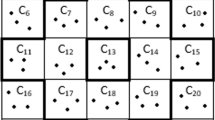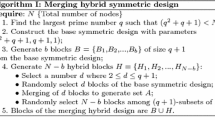Abstract
Key pre-distribution techniques for security provision of Wireless Sensor Networks (WSNs) have attracted significant interests recently. In these schemes, a relatively small number of keys are randomly chosen from a large key pool and loaded on the sensors prior to deployment. After being deployed, each sensor tries to find a common key shared by itself and each of its neighbors to establish a link key to protect the wireless communication between themselves. One intrinsic disadvantage of such techniques is that some neighboring sensors do not share any common key. In order to establish a link key among such neighbors, a multi-hop secure path may be used to deliver the secret. Unfortunately, the possibility of sensors being compromised on the path may render such establishment process insecure.
In this work, we propose and analyze an Incremental Redundancy Transmission (IRT) scheme that uses the powerful Maximum Distance Separable (MDS) codes to address the problem. In the IRT scheme, the encoded secret link key is transmitted through multiple multi-hop paths. To reduce the total information that needs to be transmitted, the redundant symbols of the MDS codes are transmitted only if the destination fails to decode the secret. One salient feature of the IRT scheme is the flexibility of trading transmission for lower information disclosure. Theoretical and simulation results are presented to support our claim.
This work was supported in part by grant number LBoR0078NR00C and by the National Science Council of Taiwan, R.O.C., under grants NSC 94-2213-E-305-001.
Preview
Unable to display preview. Download preview PDF.
Similar content being viewed by others
References
Eschenauer, L., Gligor, V.D.: A key-management scheme for distributed sensor networks. In: Proc. of the 9th ACM conference on Computer and communications security, Washington, DC, USA, pp. 41–47 (2002)
Chan, H., Perrig, A., Song, D.: Random key predistribution schemes for sensor networks. In: Proc. of IEEE Symposium on Security and Privacy, Berkeley, California, pp. 197–213 (2003)
Du, W., Deng, J., Han, Y.S., Varshney, P.K., Katz, J., Khalili, A.: A pairwise key pre-distribution scheme for wireless sensor networks. ACM Trans. on Information and System Security 8, 228–258 (2005)
Liu, D., Ning, P.: Establishing pairwise keys in distributed sensor networks. In: Proc. of the 10th ACM Conference on Computer and Communications Security (CCS 2003), Washington, DC, USA, pp. 52–61 (2003)
Camtepe, S.A., Yener, B.: Combinatorial design of key distribution mechanisms for wireless sensor networks. In: Samarati, P., Ryan, P.Y.A., Gollmann, D., Molva, R. (eds.) ESORICS 2004. LNCS, vol. 3193, pp. 293–308. Springer, Heidelberg (2004)
Lee, J., Stinson, D.R.: A combinatorial approach to key predistribution for distributed sensor networks. In: Proc. of IEEE Wireless Communications and Networking Conference (WCNC 2005), New Orleans, LA, USA (2005)
Papadimitratos, P., Haas, Z.J.: Secure message transmission in mobile ad hoc networks. Elsevier Ad Hoc Networks 1, 193–209 (2003)
Tsirigos, A., Haas, Z.J.: Multipath routing in the presence of frequent topological changes. IEEE Communication Magazine, 132–138 (2001)
Rabin, M.O.: Efficient dispersal of information for security, load balancing, and fault tolerance. Journal of the Association for Computing Machinery 36, 335–348 (1989)
Pursley, M.B., Sandberg, S.D.: Incremental-redundancy transmission for meteor-burst communications. IEEE Trans. on Communications 39, 689–702 (1991)
Wicker, S.B., Bartz, M.J.: Type-II hybrid-ARQ protocols using punctured MDS codes. IEEE Trans. on Communications 42, 1431–1440 (1994)
Du, W., Deng, J., Han, Y.S., Chen, S., Varshney, P.K.: A key management scheme for wireless sensor networks using deployment knowledge. In: Proc. of the 23rd Conference of the IEEE Communications Society (Infocom 2004), Hong Kong, China, pp. 586–597 (2004)
Wicker, S.B., Bhargava, V.K.: Reed-Solomon Codes and Their Applications. IEEE Press, Piscataway (1994)
Lou, W., Fang, Y.: A multipath routing approach for secure data delivery. In: Proc. of IEEE Military Communications Conference (MILCOM 2001), McLean, VA, USA, pp. 1467–1473 (2001)
Author information
Authors and Affiliations
Editor information
Editors and Affiliations
Rights and permissions
Copyright information
© 2005 Springer-Verlag Berlin Heidelberg
About this paper
Cite this paper
Deng, J., Han, Y.S. (2005). Using MDS Codes for the Key Establishment of Wireless Sensor Networks. In: Jia, X., Wu, J., He, Y. (eds) Mobile Ad-hoc and Sensor Networks. MSN 2005. Lecture Notes in Computer Science, vol 3794. Springer, Berlin, Heidelberg. https://doi.org/10.1007/11599463_71
Download citation
DOI: https://doi.org/10.1007/11599463_71
Publisher Name: Springer, Berlin, Heidelberg
Print ISBN: 978-3-540-30856-0
Online ISBN: 978-3-540-32276-4
eBook Packages: Computer ScienceComputer Science (R0)




